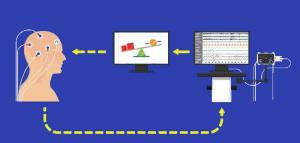How to help a hypochondriac? 7 useful tips
Hypochondriasis is the frequent preoccupation with one's health, experiencing exaggerated sensations of possible physical symptoms that lead to much alarmism and concern.
Hypochondriacs are very worried about suffering from a disease, which leads them to visit to the doctor a lot or, in a totally opposite way, not going to have check-ups for fear of what they might find.
Knowing how to help a hypochondriac is not an easy task, but there are many ways to reduce your psychological discomfort and avoid wearing down your closest circle. Next we will see some ways to achieve it.
- Related article: "Hypochondria: causes, symptoms and possible treatments"
Hypochondriasis, an increasingly common problem
Hypochondriasis is a frequent health concern, experiencing alarm thoughts about symptoms that may have no medical significance. This syndrome has been aggravated in the Internet age, given that by having free access to medical information, there are many people who believe they are manifesting symptoms where there are none, or exaggerating sensations and relating them to very serious.
It is also because of the Internet that the population has access to unreliable sources of information that pretend to be truthful, which can lead them to take inappropriate health measures. People fall into the self-diagnosis trap by reading these media, interpreting their state of health without really knowing how to do it or if it is even necessary to give more importance to what symptoms.
Whatever the cause of hypochondriasis, the truth is that because of it the person suffers physical symptoms, chronic pain without real organic cause and mood disturbances. Excessive health-related behaviors can lead to the person having conversations focused on health or feeling, almost immediately, any of the symptoms that they have read about or those that have been aware.
As a result, the patient visits the doctor many times to find the diagnosis that justifies his supposed symptoms, and to understand his suffering. When the doctor rules out the disease, the patient feels relief but, after a while, he goes back to his old ways. The opposite case can also occur, that excessive concern about the disease leads the person to avoid doctors for fear of confirming it.
How to help a person with hypochondria?
There are several ways in which we can help people who suffer from symptoms of hypochondria.
1. Encourage him to seek psychological help
When you try to reason with the person about what is happening to him, you run the risk of getting into a psychological game that wears us down and doesn't help.
Knowing how to overcome hypochondria is not an easy task, and it is quite likely that we will feel a bit far from the solution when we interact with our hypochondriac acquaintance.
In this case, it is best to encourage him to ask for psychological help, so that a therapist can apply the appropriate treatment and reduce their symptoms, treating fear and obsession with diseases.
2. understanding and patience
Among the main keys to help hypochondriacs, the important thing is to be empathetic and patient. People who are excessively concerned about their state of health The last thing they need is watching their family and friends drift away.. This can cause them more stress, which would further worsen their psychological condition.
Stress and anxiety have a direct effect on sensitivity to the slightest symptoms, increasing their perceived seriousness and fueling fear and worry. The best we can do is be patient and understanding, offering positive feedback.
In most cases, patients suffering from hypochondriasis they feel that they are misunderstood and judged for carrying out behaviors that may seem exaggerated to others.
- You may be interested in: "Types of Anxiety Disorders and their characteristics"
3. Do not make negative evaluations
Another of the symptoms of hypochondriasis is that patients tend to magnify their discomfort, which leads those around them to make negative assessments of their own discomfort. Comments like "you exaggerate" or "if it's nothing" don't help.
You should try to be empathetic and understand that your manifestations are the result of how you feel, worries that he lives as something of life or death.
4. Avoid overprotection
Sometimes it happens that the close environment falls into the trap of exaggerating the patient's symptoms, and feeding their concern and thinking that he really suffers from a very serious medical condition, thinking that they can do something for such an imaginary disease.
You have to understand that yes we can influence the health of our circle, whether or not you have a real health problem. If you have it, it is best to see a doctor or psychologist, when necessary. If not, it is best to avoid falling into his game, but, as we have said, avoid judging him.
Overprotection should also be avoided if you have an actual medical condition. There are things that do not depend on us, but on the progress of the disease itself.
5. Distraction
One of the main characteristics of hypochondria is the constant and obsessive preoccupation with any physical sensation. The person cannot take their focus off any physical problem they feel, exaggerating its severity.
It is for this reason that a good way to reduce your problem is make him distract himself with hobbies, such as reading, playing sports, cooking, watching series, listening to music... The goal is to get to do something that breaks your obsessive train of thought with diseases.
6. Follow expert and official sources
One of the problems of the internet age is information overload. This can come from different channels, such as web pages, instant messaging chains in which hoaxes are posted, or simply abusing and misinterpreting information from reliable sources.
Firstly, reliable information must be consulted on the Internet and, secondly, accompany the family member during this search to relativize the seriousness and realism of such symptoms. Understand that, if you are not a doctor, what is on the internet is only information that can be interpreted by professionals, and that looking for it and reading it diagonally is useless.
7. Accompany you to the doctor
As we have already mentioned, hypochondriacs usually go to the doctor's office. The best thing that can be done in these cases is to accompany him and, once the visit is over, highlight what what the doctor has said, indicating why the professional is a reliable and realistic source of your condition health.
The diagnosis given by the doctor is the confirmation or refutation that you have a medical condition. Obviously, it can happen that the doctor has been negligent, but in these cases you can go to a second medical opinion, who will refute or confirm the first diagnosis.
Bibliographic references:
- Berrios GE (2001) Hypochondriasis. History of the Concept. In Starcevic V & Lipsitt DR (eds). Hypochondriasis. Oxford, Oxford University Press, 3-20.
- Avia MD, Ruiz MA (2005). "Recommendations for the Treatment of Hypochondriac Patients". Journal of Contemporary Psychotherapy. 35 (3): 301–13. doi: 10.1007/s10879-005-4322-3
- Kring AM, Davison GC, Neale JM, Johnson SL (2007). Abnormal Psychology with Cases (10th ed.). wiley. ISBN 978-0-471-71260-2.



